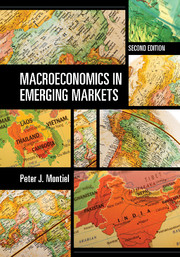Book contents
- Frontmatter
- Contents
- Preface
- PART 1 THE MACROECONOMIC FRAMEWORK
- PART 2 A BENCHMARK MACROECONOMIC MODEL
- PART 3 PUBLIC FINANCE AND MACROECONOMIC PERFORMANCE
- PART 4 MONETARY INSTITUTIONS AND MONETARY POLICY
- PART 5 EXCHANGE RATE MANAGEMENT
- PART 6 THE FINANCIAL SECTOR AND MACROECONOMIC PERFORMANCE
- 20 Finance, Welfare, and Growth
- 21 Financial Repression
- 22 Financial Reform
- 23 The Benchmark Model with Banks
- 24 Coping with Capital Inflows
- PART 7 VARIETIES OF EMERGING-MARKET CRISES
- Index
- References
24 - Coping with Capital Inflows
Published online by Cambridge University Press: 05 June 2012
- Frontmatter
- Contents
- Preface
- PART 1 THE MACROECONOMIC FRAMEWORK
- PART 2 A BENCHMARK MACROECONOMIC MODEL
- PART 3 PUBLIC FINANCE AND MACROECONOMIC PERFORMANCE
- PART 4 MONETARY INSTITUTIONS AND MONETARY POLICY
- PART 5 EXCHANGE RATE MANAGEMENT
- PART 6 THE FINANCIAL SECTOR AND MACROECONOMIC PERFORMANCE
- 20 Finance, Welfare, and Growth
- 21 Financial Repression
- 22 Financial Reform
- 23 The Benchmark Model with Banks
- 24 Coping with Capital Inflows
- PART 7 VARIETIES OF EMERGING-MARKET CRISES
- Index
- References
Summary
As indicated in Chapter 22, many emerging and developing economies have embarked on the road to financial reform during the past two decades. We also saw in that chapter that an important component of such reform has been the liberalization of the capital account of the balance of payments. Restrictions on capital movements have been removed or greatly weakened in many of these economies, in a process that gathered force around the world during the late 1980s and early 1990s. This process of financial reform and capital account liberalization was part of a much broader reorientation of economic policies among emerging economies toward a much more market-friendly disposition. In the international financial arena, this switch in policy regimes marked the transition from the debt crisis conditions that many emerging and developing economies experienced during the 1980s (see Chapter 25) to a situation in which several emerging economies became the recipients of large amounts of private capital from the rest of the world, surpassing in magnitude the flows associated with the 1974–1981 inflow episode that preceded the international debt crisis of the early 1980s. Capital inflows grew rapidly during the decade of the 1990s but stabilized in the wake of the succession of financial crises that afflicted emerging economies during the late 1990s and early 2000s, before accelerating once again after 2002 and collapsing during the international financial crisis of 2008. Figure 24.1 shows the evolution of capital flows to emerging and developing economies over the entire 1970–2008 period.
Information
- Type
- Chapter
- Information
- Macroeconomics in Emerging Markets , pp. 577 - 608Publisher: Cambridge University PressPrint publication year: 2011
